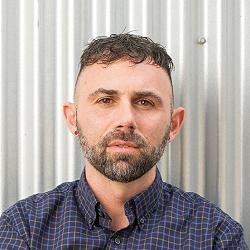Faculty

- Pronouns he, him, his, his, himself
- Title
- Professor
- Division Social Sciences Division
- Department
- Psychology Department
- Stevenson College
- John R. Lewis College
- Affiliations John R. Lewis College, Stevenson College, Queer and Sexualities Studies
- Phone 831-459-1050
- Fax 831-459-3519
- Website
- Office Location
- Social Sciences 2, 351
- Office Hours (Summer Session 2, 2024) By appointment
- Mail Stop Psychology Faculty Services
- Faculty Areas of Expertise Sexuality, LGBT+, Psychology, Queer Studies, Social Justice, Social Psychology
- Courses PSYC 140H: Sexual Identity & Society, PSYC 159S: Queer Intimacies, PSYC 255: Qualitative Inquiry in Psychology
- Advisees, Grad Students, Researchers Daniel Copulsky, Logan Lettieri Barsigian
Summary of Expertise
Professor Hammack is an expert on sexual and gender diversity, with particular interest in the following areas:
· Newer or more visible sexual and gender identities in the 21st century, including nonbinary gender, pansexuality, ace spectrum identities, polyamory, sexual subcultures and identities, sapiosexuality, ecosexuality
· Experiences of stigma among those expressing intimate diversity, including those who practice consensual nonmonogamies, kink/BDSM, and those who form queer chosen families
· Queer men’s health and identity development in the 21st century, with a focus on queer masculinities, sexual health and subcultures, and stigma and mental health
· The use of psychedelic medicine among those diverse in gender or sexuality to process trauma and promote health and wellbeing
· Paradigm, theory, and method in the social sciences, with a particular interest in narrative theory and methods, social justice, cultural psychology, and life course theory
Embedded in all of Professor Hammack’s current work is an interest in the following:
· Generational and intersectional patterns of experience
· Social technology mediation (i.e., the role of social media in experience and development)
· Legal, institutional, and social policies regarding sexual and gender diversity
· Accessibility and practical application of knowledge produced
Professor Hammack is currently accepting new graduate students to join the Sexual and Gender Diversity Laboratory whose interests align with any of the items outlined above. He also works closely with undergraduates interested in conducting independent senior theses on any of these topics.
Research Interests
- Sexual & gender diversity, including nonbinary gender and plurisexual (e.g., bisexual, pansexual, queer) identities, ace spectrum identities, sexual subcultures and identities, sapiosexuality, ecosexuality
- Intimate diversity, including polyamory and other consensual nonmonogamies, kink/BDSM, and chosen families
- Queer men's health and identity development, with a focus on queer masculinities, sexual health and subcultures, and stigma and mental health
- Psychedelic medicine for those diverse in gender or sexuality
- Paradigm, theory & method in the social sciences
Biography, Education and Training
PhD, University of Chicago
MA, Loyola University, Chicago
AB, Georgetown University
Honors, Awards and Grants
President, Society for Qualitative Inquiry in Psychology
Fellow, American Psychological Association, Divisions 5, 9, & 44
Fellowship, Center for Advanced Study in the Behavioral Sciences, Stanford University (2017-2018)
R01 Research Grant, National Institute of Child Health and Human Development (NICHD) (2014-2019)
William T. Grant Foundation Scholar Award (2013-2018)
Erik Erikson Early Career Award, International Society of Political Psychology (2013)
Louise Kidder Early Career Award, American Psychological Association, Division 9 (SPSSI) (2011)
Selected Publications
Hammack, P. L., & Manago, A. (2024). The psychology of sexual and gender diversity in the twenty-first century: Social technologies and stories of authenticity. American Psychologist. https://doi.org/10.1037/amp0001366
Hammack, P. L., & Wignall, L. (2024). “Be dog have fun”: Narratives of discovery, meaning, and motivation among members of the pup subculture. Sexuality & Culture. https://doi.org/10.1007/s12119-024-10242-y
Hammack, P. L., & Wignall, L. (2023). Sexual and gender diversity in the twenty-first century. Current Opinion in Psychology. https://doi.org/10.1016/j.copsyc.2023.101616
Hammack, P. L., Pletta, D. P., Hughes, S. D., Atwood, J. M., Cohen, E. M., & Clark, R. C. (2022). Community support for sexual and gender diversity, minority stress, and mental health: A mixed-methods study of adolescents with minoritized sexual and gender identities. Psychology of Sexual Orientation and Gender Diversity. https://doi.org/10.1037/sgd0000591
Hammack, P. L., Hughes, S. D., Atwood, J. M., Cohen, E. M., & Clark, R. C. (2022). Gender and sexual identity in adolescence: A mixed-methods study of labeling in diverse community settings. Journal of Adolescent Research, 37(2), 167-220. https://doi.org/10.1177%2F07435584211000315
Josselson, R., & Hammack, P. L. (2021). Essentials of narrative analysis. American Psychological Association Press. https://doi.org/10.1037/0000246-000
Hammack, P. L., Frost, D.M., & Hughes, S.D. (2019). Queer intimacies: A new paradigm for the study of relationship diversity. Journal of Sex Research, 56, 556-592. https://doi.org/10.1080/00224499.2018.1531281
Hammack, P. L. (Ed.). (2018). The Oxford handbook of social psychology and social justice. Oxford University Press.
Hammack, P. L. (2018). Gay men’s identity development in the twenty-first century: Continuity and change, normalization and resistance. Human Development, 61, 101-125. https://doi.org/10.1159/000486469
Hammack, P. L. (2018). Social psychology and social justice: Critical principles and perspectives for the twenty-first century. In P. L. Hammack (Ed.), The Oxford handbook of social psychology and social justice (pp. 3-39). Oxford University Press. https://doi.org/10.1093/oxfordhb/9780199938735.013.1
Teaching Interests
Sexual Identity & Society
Sexual & Gender Diversity
Intimate Diversity
Narrative Identity
Qualitative Inquiry in Psychology
